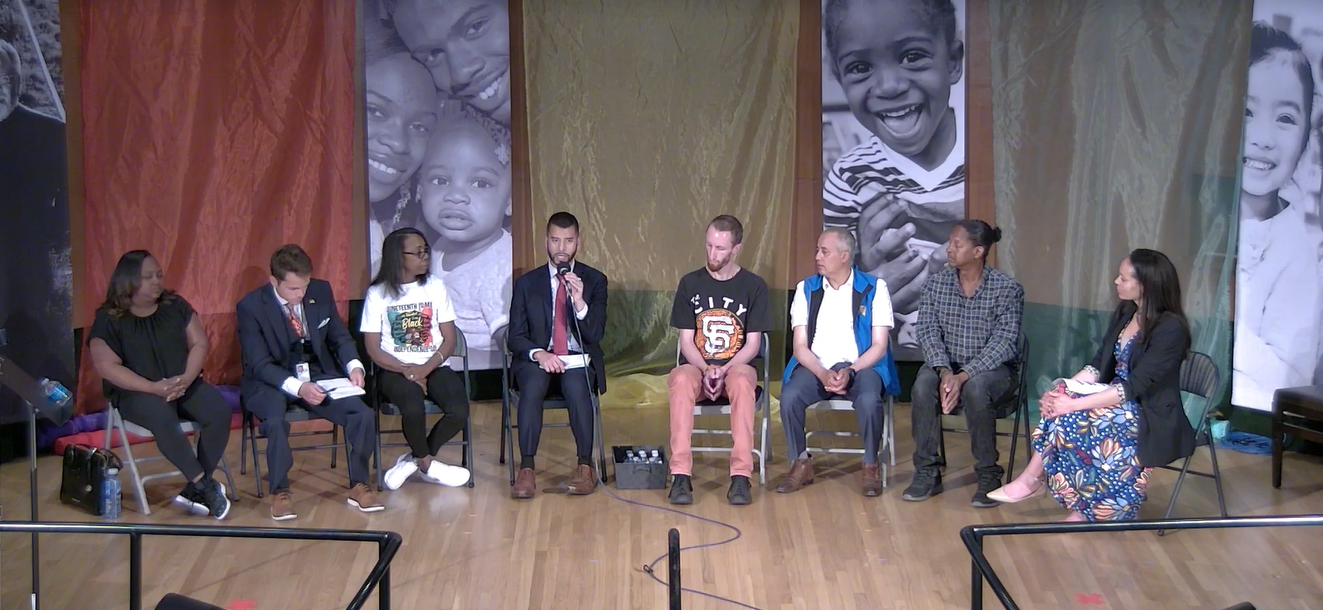
GLIDE’s Center for Social Justice Director Dr. Holly Joshi (far right) hosts a roundtable discussion with representatives from local food organizations and the USDA
June 15th, 2023
GLIDE’s presence in the Tenderloin acts as a pivotal haven of hope not just for Black residents but LGTBQIA2S+, those with disabilities, new immigrants, and anyone who has ever felt marginalized and/or in need of love and support.
Representatives from the United States Department of Agriculture (USDA) and local organizations came face to face inside Glide Memorial Church’s sanctuary this month to follow-up on a prior visit and discuss the successes and challenges in tackling racial equity and food security.
GLIDE’s Director for the Center of Social Justice, Dr. Holly Joshi served as moderator and guided the conversation around food scarcity and the barriers still facing people of color who struggle to see their voices integrated into the availability and delivery of fresh food.
Roundtable Success Stories
On the roundtable, Pamela Brown, GLIDE’s Zero Food Waste Pantry Coordinator described the achievements of GLIDE’s pantry program, a sustainability-focused initiative that started off in 2021 making available nourishing food in reusable and compostable containers to 30 food-insecure families a week and is now serving approximately 100 families a week.
“When COVID-19 seemed everywhere, many lost their jobs and families suffered,” said Brown. “GLIDE saw a need for the pantry, and the opportunity to give food that these families needed and wanted, and we haven’t stopped since.”
Richard Patrick of From the Heart, shared how during the pandemic, he heard about the availability of free groceries in the Bayview neighborhood only to find himself one week later delivering those groceries to seniors and those with disabilities who were unable to leave their homes.
Pia Harris, founding member of the Fillmore Merchants and Neighborhood Collaborative and the Fillmore and Japantown for Justice Coalition reflected upon COVID-19’s impact and how difficult it was to distribute grocery bags that contained culturally inappropriate food.
“Many times, we were stuck giving food away that many in the Black community or seniors who were on special diets couldn’t really make use of, which is why we created our own food security program, making sure there were options that met the diverse needs of our community,” said Harris.

Alberto A. Gonzalez, Jr., USDA speaking to Dr. Holly Joshi, GLIDE’s Director of Center for Social Justice
USDA Policies and Actions
The disparity in who is experiencing poverty and hunger in San Francisco is discouraging. Black residents who make up 6% of the city’s population, now constitute 38% of its homeless population, and makes up 69% of people served at GLIDE are people of color.
Alberto A. Gonzalez, Jr., USDA’s Senior Advisor for External Engagement Food and Nutrition Service recognizes the gravity of the problem. The pandemic exacerbated the disparities in local communities when it came to equitable food access.
“USDA staff understand the relationship between systemic racism and food insecurity and we’re using data informed decision making to help us devise policies in response to it,” said Gonzalez.
“Right now, under the current Biden administration, we’re busy expanding healthcare, increasing the minimum wage, advancing the child tax credit, and looking at further ways to empower families economically.”
Alexei Schnakenburg, USDA’s Program Specialist and the Regional Chairperson of the department’s Food and Nutrition Service described the presence of “food deserts” in communities such as the Tenderloin, Hunter’s Point or Bayview where the paucity of grocery stores means residents must travel outside their local environs and travel across the city to get access to fresh fruit and vegetables.
Schnakenburg tipped his hat to the Supplemental Nutrition Assistance program (SNAP) and how the USDA initially rolled out an online pilot version that enabled users to order food online.
“When the pandemic hit, we were forced to pivot and work within existing regulations to collaborate with stores and states across the country, acting as a thought partner, to move SNAP ordering and shopping online,” said Schnakenburg. “What started 3 years ago during the pandemic and was only accessible to a handful of states is now available across all 50 states.”
A Hopeful Future
Local organizations continue to work on improving fresh food access and availability, along with reducing systems of racial oppression. “We’re excited to continue to be able to offer hot, fresh cooked meals to our seniors who are still at home,” summarized Pia Harris of Fillmore Merchants. “Because they cannot cook for themselves, they normally would go to Mcdonalds. We’re now feeding up to 1,000 seniors a year and we just got funding to continue our program for another two more years!”
Gonzalez also touted a recently authorized program by Congress called the Summer Electronic Benefit Transfer for Children (SEBTC) which will debut in the summer of 2024. Back in 2022, Congress authorized the Summer EBT as a permanent, nationwide program. It will provide families whose children are eligible for free and reduced-price school meals with grocery benefits on a debit-type card during the summer months.
According to the USDA, this model has been proven to decrease food insecurity among children through Summer EBT demonstration projects. A permanent summer EBT will help close the summer hunger gap for more than 29 million families across the country.
“It’s vital for the USDA to have trusted community partners to help us spread the word about the Summer EBT” said Gonzalez. “I also encourage all local communities to also raise their voices about the upcoming Farm bill renewal as well.”
To watch the entire roundtable discussion, visit the GLIDE Facebook page.
